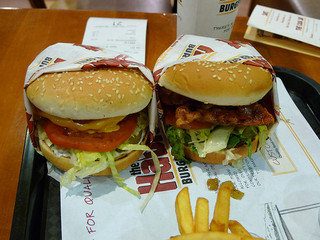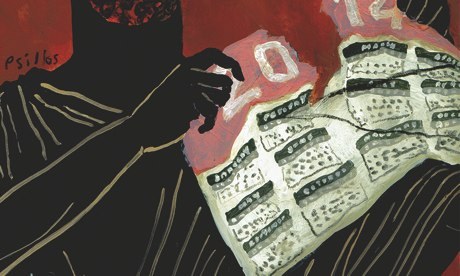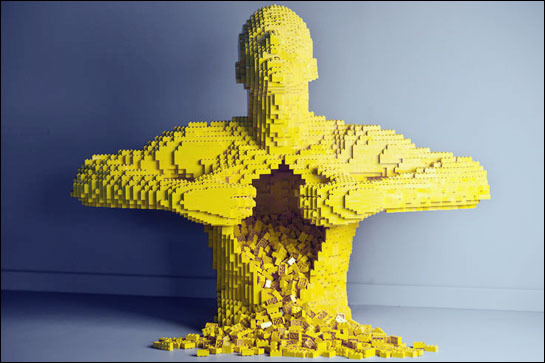Let the calendar decide
 Oliver Burkeman writes the weekly This Column Will Change Your Life for the UK Guardian. The column is a brief, cheeky, well-researched survey of self-help topics of all sorts, from philosophy to life hacks. Burkeman is himself an author of a self-help book that is on my personal wishlist.
Oliver Burkeman writes the weekly This Column Will Change Your Life for the UK Guardian. The column is a brief, cheeky, well-researched survey of self-help topics of all sorts, from philosophy to life hacks. Burkeman is himself an author of a self-help book that is on my personal wishlist.
He had an interesting confluence of topics recently: one on “triple constraints” and one on adopting a 12-week, rather than 12-month, perspective on goal-setting.
The “iron triangle” is that eternal triad of choices from which only two can be selected. The classic triple constraint is “You can have it fast, good, or cheap. Pick two.” Burkeman lists constraints for other domains, such as home cooking (“tasty, nutritious, or easy to make”) and vacations (“exotic, cheap, or relaxing”). Resources are limited and choices have to be made. As Burkeman says,
…[H]istory is littered with the corpses of businesspeople and politicians who foolishly thought they could ignore [the triple constraint]. Respect it, on the other hand, and even the sky may be no limit. When JFK promised to get a man on the moon within a decade, he wisely didn’t also promise to get it done cheap.
But the triple constraint isn’t the only model for this kind of choice theory. David Sedaris writes about meeting a woman who went to a management seminar where she was told that everyone has four burners in life: family, friends, work, and health. Turn off one of those burners, and you’re a success. Turn off two of those burners, and you’re a big success. The woman Sedaris described had chosen to focus on work and friends — and she was a big success.
James Patterson wrote about juggling five balls: family, friends, health, spirit, and work. The work ball is made of rubber while the others are made of glass. If you drop the work ball, it’ll bounce right back. But if you drop any of the other balls, they’ll scuff or scratch or shatter permanently.
As Burkeman says, the idea is to realize that you can’t have it all, that life is about trade-offs and you have to make choices. But some people, when faced with this menu of choices, paralyze themselves and decide not to choose. And because they refuse to choose, they may endure suffering worse than the momentary pain of having to give something up. Even if the giving up is only for a little while. And so instead of moving forward even a little bit, mindful of constraints, they choose to stay in place.
Is there a way to make that choosing easier? In an earlier column, Burkeman described the psychology of the “goal-looms-larger effect”: that burst of extra energy you get finishing all that work just before leaving on vacation. By the same token, the further away a goal is, the less urgent it appears and so the less hard you work towards it. This inclines us to slack off and think, “Oh well, that’s months in the future — I’ll start tomorrow. Or next week.”
The 12-Week Year argues that a year is simply too long of a timeframe to work with. The goal is so far away that one never feels the emotional juice to run toward it. And too many unpredictable events — health crises, home emergencies, sick family members — over the course of a year that you can’t predict or plan around.
So the authors instead suggest breaking the calendar year into smaller 12-week “years.” Scale your goals and tasks to fit inside that smaller box, create a list of weekly tasks that you can check off, and you stand a greater chance of meeting your scaled-down “annual” goals. By the end of the calendar year, you’ll have likely accomplished far more than if you’d spread the work out over the standard 12 months.
This isn’t a new idea to me. JD Meier, in his book Getting Results the Agile Way, and on his Sources of Insight blog, has long recommended adopting three major accomplishments for the year, each quarter, each month, each week, and each day. It’s not hard to see how one can take a large goal, such as losing weight or finding a new job, and then break those big amorphous goals down into smaller, more concrete quarterly, monthly, weekly, and daily tasks. The 12-Week Year authors have taken that chunking-down idea and packaged it in a smarter way. (I’ve not read their book, so I’m sure they’ve added their own flourishes and enhancements to the process, too.)
So maybe one way to reconcile oneself to tough choices — whether triple constraints, four burners, or five juggling balls — is simply to timebox. Pick a period of time — whether it be 12 weeks, from now till July 4th, from March 15 to April 15 — make the hard choice and try it out. Play with it. Leave one of the burners off, drop one of the balls. You can do it knowing that it’s possible to pick them up again in the next time period. This way, you can rotate through each area of focus throughout the year, knowing that your choice is both firm and not forever.
This reminds me also of Steve Pavlina’s “one week on, one week off” idea, which he attributes to Napoleon Hill. Go full out for an entire week — writing, programming, cooking — and then take the next week off.
These issues are alive to me at the moment because, of course, I have choices to make and focus is sometimes hard for me to achieve. Too many wonderful things to do, not enough time for everything I’d like to do, and no optimal blend that will balance everything on a daily basis. So the solution that bubbles up for now is to not try to balance things. Pick an area or project, focus on it during my evening project-time, and let go of those things that don’t fit in the timebox. When the project is done or at a place where it can be maintained with minimal effort, then see what else in my life needs that attention. Look for balance in the long-term.
That’s the plan, anyway. We’ll see how it goes.




